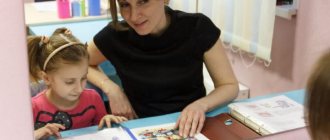Speech therapy work in a general education preschool institution. article on speech therapy on the topic
Speech therapy work in a general education preschool institution.
Speech therapist teacher: Golikova A.V.
The purpose of the work of a speech therapist at a preschool educational institution is to provide timely correctional and developmental assistance to preschool children with speech disorders.
Tasks:
— carry out the necessary correction of speech disorders in preschool children;
— prevent violations of oral and written speech in preschool children;
— to develop voluntary attention to the sound side of speech in preschool children;
— to promote speech therapy classes among teachers of MKDOU, parents of pupils (their substitutes);
— to cultivate in children the desire to overcome speech deficiencies and maintain emotional well-being in their adaptive environment;
— improve the methods of speech therapy work in accordance with the capabilities, needs and interests of the preschooler;
— integrate the upbringing and education of children in the general education group with receiving specialized assistance in speech development.
In the practice of modern education, there is a growing gap between the real situation of the increasing need for corrective and preventive influence at an early age and the existing regulatory and legal framework that regulates the activities of the preschool educational institution’s speech center and constrains the provision of timely speech therapy assistance to children.
In middle and older age, deviations in speech acquisition become more complex and develop into various forms of speech disorders. The largest number of children with speech disorders were identified at the age of 4–5 years (91%), 5–6 years (85%). At the same time, only older (preparatory) age children receive assistance within the preschool speech center, and work with younger children is limited to creating a data bank on speech disorders and counseling parents.
Due to the increase in the number of preschool children with certain speech development disorders, it is impossible to provide them with correctional and pedagogical assistance and only within the framework of speech therapy groups. Moreover, the role and importance of speech therapy centers in preschool educational institutions is increasing as one of the most realistic and effective ways to ensure high speech and socio-psychological adaptation of children with speech disorders to the conditions of school education.
The choice of methods and forms of providing speech therapy assistance is directly related to the determination of the characteristics of children, the educational needs of parents (legal representatives), and the capabilities of the regional education system itself, which together identifies the following forms of organizing speech therapy intervention:
· Groups for children with physical disabilities and special needs;
· Speech therapy centers in preschool educational institutions;
· Intragroup differentiation of individual pedagogical work with children in the course of regulated and unregulated activities (the work comes down to the development of children’s speech, the formation of a coherent, expressive and logical statement in them).
A preschool speech therapy center is the “youngest” form of organizing speech correction assistance for children with speech impairments. Unfortunately, there is still not a single federal level regulatory document on this model of organizing speech therapy care. Publications in a number of publications, especially in the scientific and methodological journal “Logoped”, help to more effectively solve issues of prevention and correction of speech defects. However, speech therapists sometimes have problems that require an extraordinary approach, both to the organization and to the selection of the content of speech correction work.
When analyzing the currently available regulations on preschool speech therapy centers in individual cities and regions of the Russian Federation, many discrepancies and inconsistencies are revealed regarding the specifics of speech therapy work with preschool children. These discrepancies and inconsistencies relate to:
— a list of types and forms of speech disabilities with which children are enrolled;
enrollment mechanism;
— the number of children studying at the speech center at the same time;
— recommended frequency of individual and group lessons for children with different structures of speech defects;
— a list of documentation of the speech therapist teacher.
Inconsistencies in a number of provisions are caused mainly by the fact that they are based on the letter of the Ministry of Education of Russia dated December 14, 2000 No. 2 “On the organization of the work of a speech therapy center in a general education institution.” The wording of the title of the letter makes it possible to assume that it also relates to the activities of the speech therapy center of the preschool educational institution, since kindergartens are also general educational institutions. But this letter entirely determines the procedure for organizing the activities of only the school logo center, which follows from the contents of the letter and its appendices.
It is inappropriate to strictly regulate the work of a speech therapist in these conditions, since strict regulation will lead to formality in the work and will not allow fully taking into account the structure of the speech defect and the psychophysical characteristics of each child; will limit the initiative and creative approach to solving correctional, organizational and methodological problems of a speech therapist.
What are the specifics of working at a preschool speech center and how does the work of a speech therapist at a speech center differ from the work of a speech therapist in a group for children with speech disorders? There are several main differences.
1) The work of a speech therapist in a mass preschool institution in its structure and functional responsibilities differs significantly from the work of a speech therapist in a speech kindergarten. This is primarily due to the fact that the speech therapist at the speech center is integrated into the general educational process, and does not go along with it in parallel, as is customary in speech kindergartens. The work of a speech therapist is based on the internal schedule of the preschool educational institution. The work schedule and schedule of classes are approved by the head of the preschool educational institution.
Unlike specialized preschool educational institutions (groups), the task of speech correction in a speech center is additional. There is no time in the children's schedule specifically allocated for classes with a speech therapist, so you have to very carefully draw up a schedule and work with the children in such a way as not to interfere with the assimilation of the preschool educational program. A speech therapist at a speech center is like a cook for a teacher; everyone has their own job. Teachers work according to their own plans, have difficulty monitoring the correct pronunciation of sounds, and have no incentive to do this work.
2) In the speech therapy group, children have the same speech conclusion, which determines the lesson program. At the speech center, children with various speech disorders (FFDD, OHP, logoneurosis, dysarthria, dyslalia, etc.) are simultaneously trained.
3) There is currently no correction program for the work of logopoints; in our work we rely on modern technologies and developments by T.B. Filicheva, O.S. Ushakova, T.A. Tkachenko, O.E. Gribova, O. Gromova E.E., Solomatina G.N., Konovalenko V.V. and S.V. and etc.
4) The speech therapist at the speech center works in a different mode from the speech garden. The main forms of organizing work with children with speech impairments are individual and subgroup classes. Our classes are short-term (15-20 minutes), short-term (2-3 times a week).
5) The speech therapist at the speech center is forced to intervene in the learning process on the day the child attends his classes. Children with speech disorders themselves receive correctional assistance in portions, and not daily, like children in a speech therapy kindergarten.
Enrollment of children in speech therapy classes occurs through the PMPK (psychological-medical-pedagogical commission), which issues a speech report and gives the parents and speech therapist an official document.
Based on the number of students studying at the same time and the total number of children who attended classes at the speech therapy center during the school year, it is advisable to determine both the maximum and minimum number of students. If there are a large number of children with severe speech impairments, it is impossible to fit more than 12 children into the speech therapist’s working time frame. At the same time, if only mild speech deficiencies are identified in the majority of children, classes can be conducted with 20 children. The same applies to the timing of correctional work, and the main forms of organization of correctional speech work and the frequency of classes.
The main form of work with preschoolers in the kindergarten speech center is individual and subgroup lessons. This is due to the following reasons:
· The need to adapt to general developmental group classes and routine moments;
· Different structure of pronunciation defects in children of the same age group;
· Different levels of development of cognitive processes in children with structurally similar defects;
· Individual pace of learning the material;
· The need to involve several sounds that are disturbed in pronunciation into work at once;
· Somatic weakness of children, entailing numerous absences due to illness, which significantly delay the process of correcting the child’s speech disorders.
These and some other reasons do not allow organizing stable subgroups of children for speech therapy sessions: subgroups of children have a variable composition and are very mobile.
All this leaves a certain imprint on speech therapy work. Therefore, very often we have to resort to forms that are rarely covered in specialized literature, namely, group production of sounds.
Another form used is individual lessons in the presence of other children. While one child is working with a speech therapist, others are playing specially selected games to develop fine motor skills, color perception, sense of rhythm, etc. This form of classes was dictated primarily by the need to save time, but then its other positive aspects emerged: greater emancipation of children in class, increased interest in the speech of their peers, motivation for their own pure speech.
The methods and techniques used during the correction process are traditional, scientifically based. However, despite the fact that the main goal of a speech therapist teacher’s work in a speech therapy center is to correct violations of sound pronunciation, tasks related to the formation of the lexical and grammatical structure of the child’s language are simultaneously solved. Replenishment of the dictionary occurs not only due to the introduction of new words into it, acting as speech material, clarification of their meaning, but also due to the word-formation skills gradually formed during classes. Figuratively speaking, in addition to correcting violations of sound pronunciation, the child receives a tool for further expanding his vocabulary, which, in turn, increases the possibilities of training exercises.
The overall success of correctional education in a speech therapy center is determined by the joint work of the speech therapist and parents. Parents become full participants in the educational process. The child receives individual correctional assistance only 2-3 times a week, so its effectiveness depends, among other things, on the degree of interest and participation of parents in speech correction. Newly formed sounds must be supported by all means, and not given to the child the opportunity to pronounce them without reinforcement and control.
The volume of advisory and methodological work of a speech therapist teacher in a speech therapy center is many times greater than the volume of similar work in a compensatory group setting, this is especially noticeable in preschool institutions with a large number of groups. And the distribution of the working time of a speech therapist teacher allocated to direct speech correction work with children, in different provisions and methodological recommendations, is characterized by great variability. From “all 4 hours of his working time, a speech therapist works directly with children” to “the weekly workload of a speech therapist in working conditions at a preschool speech therapy center is 20 hours, of which 15-16 hours are allocated to direct work with children, 4-5 hours - to organizational -methodological and advisory work with preschool teachers and parents.” Since the frequency and volume of advisory work are revealed in the process of speech correction work, then in the speech therapist’s working time for this, of course, there must be time free from classes with children.
Sincerely your teacher-speech therapist: Golikova A.V.
European countries
In Europe, speech therapists are called speech therapists. To work, you need to obtain a secondary medical education. Specialists work both in government agencies and privately (the latter is not permitted everywhere; such activities are prohibited in Denmark).
Rehabilitation centers and departments in hospitals are being created. Speech therapists work in kindergartens and schools. They conduct monitoring and identify risk groups. Unlike Russia, in Europe the field is more biased towards medicine than pedagogy.
The highest level of training is in Belgium, Portugal, and Holland.
In Germany, training is divided into two stages. At the time of division into two parts, there was a system of retraining of personnel - educators and primary teachers had the right to undergo additional training for two years. After which they were considered speech therapists.
In the modern world, a person first receives a bachelor's degree and his skills are focused on practical activities. Afterwards he can become a master, and this is more necessary for those who are going to develop science.
Views on correction differ. When stuttering, the main work is done by a psychologist. Attention is paid to the integration of children with disabilities into the environment of ordinary children.
Methods for correcting autism, autism spectrum disorder (ASD), and cerebral palsy (CP) were developed in Europe and then transferred to Russia. Behavioral methods are widely used in teaching.
Pros and cons of the profession
Working with children is not so easy. Speech pathologists (persons with speech pathologies) are distinguished by problems of a personal nature. You will have to spend effort to establish contact. Another disadvantage of the specialty is that you have to wait a long time for the results. In case of severe violations, a person will have to work for 3-4 years to improve the situation.
It takes about three to five years to eliminate alalia, stuttering, and aphasia. In some cases, slight improvement can be achieved.
In kindergartens and schools, specialists are forced to fill out a large amount of documentation. This is not included in working hours.
A significant disadvantage is low wages. In the regions, the average rate is 10 thousand rubles. In Moscow and St. Petersburg the situation is better, there it is about 44 thousand.
The advantages include a short working day - in government agencies it is 4 hours. An allowance is made for special working conditions - vacation lasts 56 days, not 28. Specialists will always be in demand, because children are increasingly having developmental problems.
There is always the opportunity to conduct a private practice. In this case, the price for the lesson is set independently.
The advantage of working is a separate office. The issue of filling it is resolved in different ways. In some places, the management of an educational institution provides it; in other situations, the speech therapist buys everything himself.
The motivation of a speech therapist is the opportunity to make people better. Correcting speech defects is fun. It is especially gratifying to see success in cases of severe violations.






